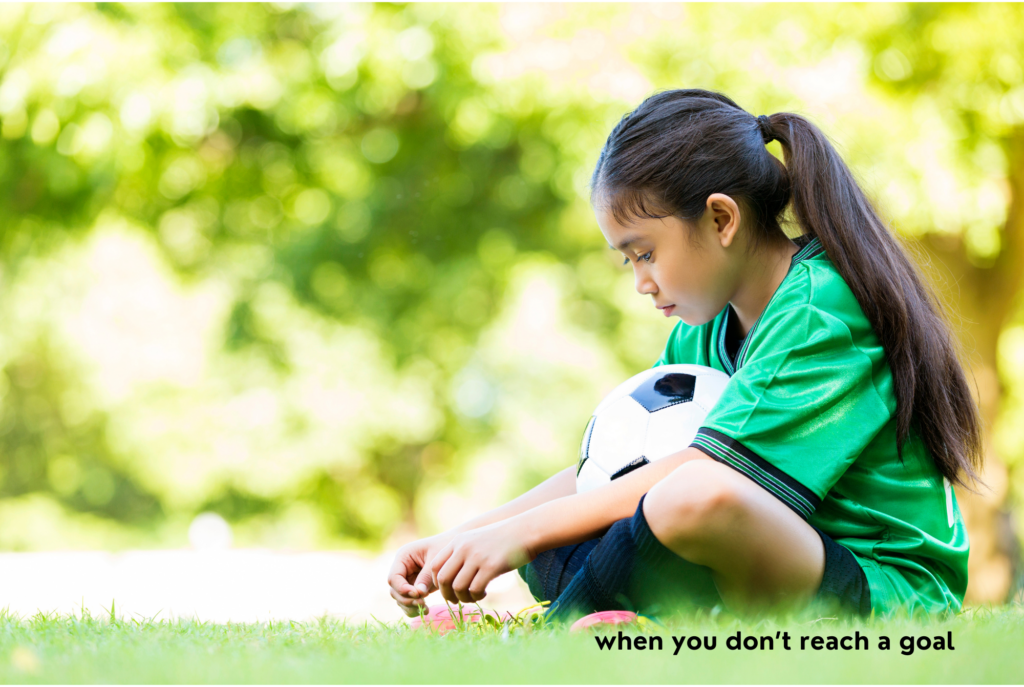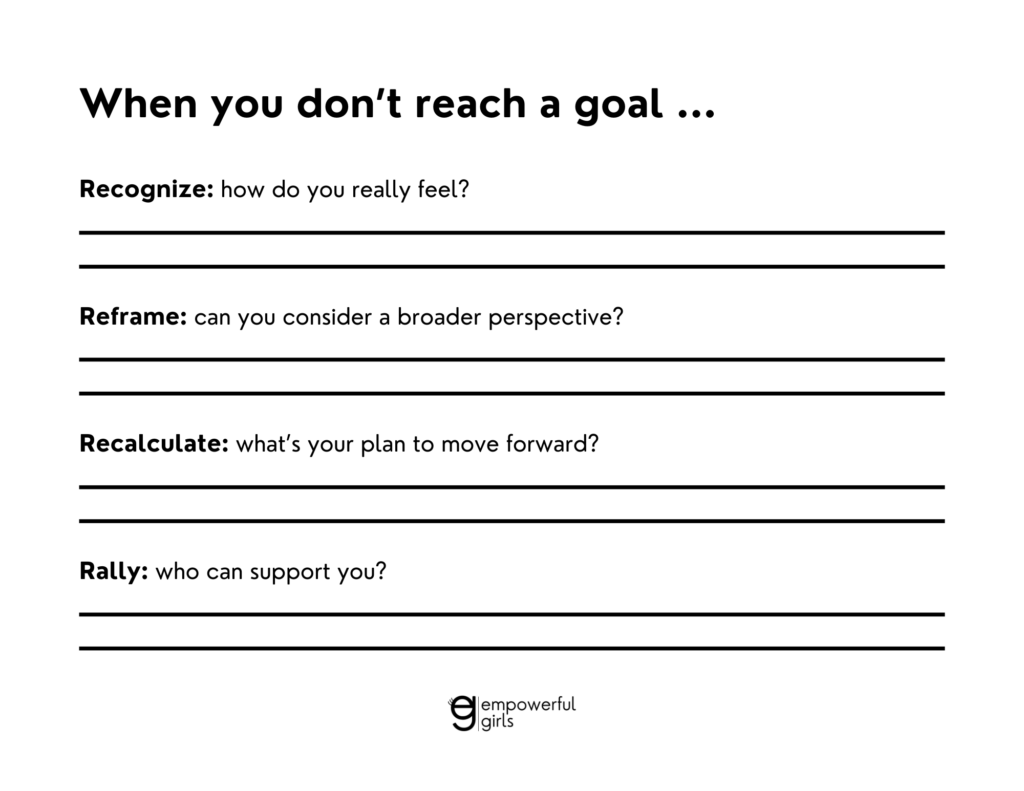
1M Birthday Goal
So it’s been a while, let’s rewind for a bit. I had an incredible birthday celebrating with my family and friends. Thank you gals for your birthday wishes, too. You may remember, a few months ago I made a big hairy audacious goal to reach 1 million podcast downloads by my birthday at the end of September. Did I get there by then? Actually, no. But I want to tell you what happened–and listen til the end for an update.
In the weeks leading up to my birthday, I tried to stay optimistic about hitting my goal. But as I saw the number of daily downloads going down, I realized I was not going to reach a million by my birthday. I was sad about it, actually. I had lots of negative self-talk thoughts–yeah, girls, I have them, too. I was weighed down by self doubt. And I questioned my efforts, like I should’ve done more to make it happen. Have you ever felt like all that? Maybe you set a goal to make the track team, earn a higher grade, or win a competition–but it didn’t work out and left you feeling pretty bad about it. Let’s explore how to handle when you set a goal and don’t reach it.
Recognize
This may surprise you, but my first piece of advice isn’t to overload yourself with optimism by looking on the bright side. Actually, dismissing your pain and suppressing your emotions with toxic positivity can have a negative effect. Other people might offer you encouragement to bounce back right away, and I’m sure their intentions are good, but you need to be real with yourself. Recognize and name all of your feelings by talking to a friend or family who will just listen to you and validate your perspective. Free writing your thoughts can be helpful too. Give yourself permission to sit with and feel your emotions. Remember from episode 021, emotions are tunnels; you have to go through them to process them. So first recognize they exist.
Like I mentioned before, I was feeling down about not reaching my million-downloads goal by my birthday. So I let myself recognize it, and it sounded like, I feel discouraged and deflated. I really thought I could do it. I’m disappointed things turned out differently than I hoped. Yeah that’s not fun to say out loud, but now I’m not stuffing it down, pretending like everything’s okay. If you don’t reach your goal; call it like it is and recognize how you feel.
Reframe
Next, reframe. We’re going through the emotion tunnel, not staying there permanently. So to help you get through it, reframe your negative thoughts. Zoom out and consider a broader perspective. If you’re so focused on one element, it’s like looking through a spyglass–like a pirate–you miss the bigger picture, the whole landscape. So instead of a spyglass, you need a panorama perspective. So I reframed like this: I feel discouraged and deflated right now, and that’s okay; I’ll feel better soon. I really thought I could do it, and I still believe in myself. I’m disappointed things turned out differently than I hoped, but I’m still proud of my efforts. That reframe has a different ring to it, right? And it had a different effect on me.
Another way you may need to reframe is considering elements that were out of your control. Sometimes we take on the full weight of responsibility for not reaching a goal, and we don’t acknowledge the other factors at play. If you ran for class secretary and lost (happened to me), part of your panorama perspective is that you couldn’t control how your classmates voted–you could influence them, but you couldn’t choose for them. Or if your team got knocked out of the playoffs, and you feel like you lost the game for the whole team because you missed a shot. You need to reframe by recognizing there were likely other errors made by your teammates, too–not to throw them under the bus, but the outcome of especially a team effort usually does not fall on one person. There’s only so much you can do to reach your goals when it depends on others’ involvement. So identify things that were not ones you could control, and reframe your perspective.
Sometimes you even have to challenge your thoughts because they’re not actually true, for instance, I’m a failure. I never follow through on my goals. I can’t even depend on myself. Did you notice any absolutes there? We talked about those in episode 001, they’re broad generalizations that make you think something going on in that moment or in the short-term is the way things always are or always will be. And that’s usually not the case. When you catch yourself thinking in absolutes, be fair and kind to yourself. Reframe your thoughts, not in a toxic positivity way, but in a productive way. This sounds like, I didn’t win, but that doesn’t make me a failure. If I keep working at my goals, I’ll keep getting closer to them. Even if I don’t win every time, I am still capable and dependable. You can set the tone for yourself by reframing your response.
Recalculate
Then you need to recalculate. I don’t mean like math calculators. Say you’re using a GPS map app for directions, and if you make a wrong turn and end up on the freeway, your app will recalculate a new route for you to take. So that’s what you need to do–figure out how you want to proceed from here. While you can seek input from friends, family or mentors, ultimately you’re in charge of your path moving forward.
If your goal is something you can keep working on without a hard deadline, you can recalculate the goal date. I didn’t reach a million downloads by my birthday, but even after the date passed, I still kept working toward it! Using a panorama perspective, the date I reached the goal wasn’t nearly as important as the goal itself. In some situations, recalculating the goal date will work and you can keep heading for your goal.
But if your goal was time sensitive–a competition or event, the end of the semester–you won’t have the opportunity to extend your deadline. Sometimes you’ll have to take an L for that specific goal, but you can recalculate what your next step will be. Is there another chance for you to try again, like next season? Or maybe this door closing will redirect you to other open doors and opportunities. Can you learn from this experience and turn this stumbling block into a stepping stone to move forward?
Also consider recalculating the goal itself–if the original goal depended heavily on factors out of your control, approach your next goal by focusing on your input more than the outcome. Like, you can’t control whether you place first at a debate tournament, but you can control how often you practice and how much time you spend studying. Do you see the difference there? Your efforts may increase the likelihood of the outcome you’re hoping to achieve, but they can’t always guarantee it. So recalculate and keep going either toward the same goal or a new one.
Rally
Finally, rally. Support systems can really help you when you don’t reach a goal. Whether that’s loving family or understanding friends or encouraging adults, reach out to your people to rally around you. Share with them the feelings you recognized, thoughts you reframed, and path ahead you recalculated. Let them know how they can help you, like cheering for you, spreading the word, assisting with something specific–ask for what you need. And express your appreciation for their support, and be sure to reciprocate for them when they need it, too.
My incredible friend knew how important my million download goal was to me, and not only did she share about my podcast on social media, but she also listened to episodes (which frankly, the podcast topics apply to many audiences). Anyway, her enthusiasm for my goal meant the world to me and reenergized me to keep heading for it.
1M Birthday Goal Update
Two and a half weeks after my birthday goal deadline passed, this podcast hit a million downloads! And when I got the notification, I texted my incredible friend, and she immediately replied with a string of celebratory emojis. Later that day she brought me balloons–like 1M for one million–and gifts to celebrate this milestone. Which meant that she believed I would reach my goal and ahead of time bought these presents for when I did. She has been an amazing cheerleader from the start, and I’m truly grateful she rallied around me.
Girls, we hit a million downloads and counting! And you know what that means to me–it’s not that I think I’m so popular, it’s that one million times a girl has heard the message that she is loved, she is seen, and that she is enough. And I’m really proud of what we’ve accomplished.
Sometimes you’ll reach your goals, sometimes you won’t, but either way I hope you don’t stop going for them. If you need help setting goals, check out episode 006. And when you don’t reach them, remember to Recognize, Reframe, Recalculate, and Rally.
When You Don’t Reach a Goal Worksheet
To help you remember all of this, I created a “When You Don’t Reach a Goal” worksheet for you to print out, personalize, and post on your wall where you’ll see it, remember it, practice it, and believe it — that’s the important part.
Resources
If you have a topic suggestion, I’d love to hear from you! Send an email (tweens get the OK from your parents) to hello@EmpowerfulGirls.com .
If you have social media already, follow me on Insta or tiktok @empowerfulgirls. I’m not encouraging or endorsing social media, but I’m on there to offer an unfiltered, uplifting alternative to what’s in your feed. Remember to get on the email list for the newsletter!
Also, if you enjoy listening to 10 for Teens + Tweens, I would truly appreciate you telling your friends about this podcast or leaving a review so others can find it and feel uplifted, too! Your support means the world to me!
